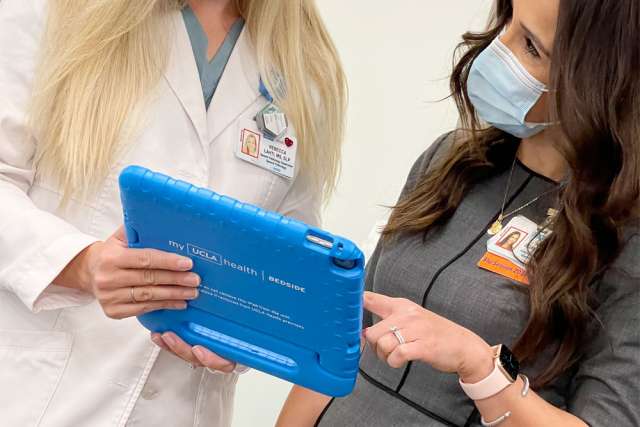Patients who have been placed on ventilators to a id breathing are unable to speak . Some other inpatients are nonverbal for different reasons, or there might be language barriers to expressing their basic needs. Now, an iPad application available to UCLA Health patients, called VidaTalk, may allow patients with significant communication challenges to easily express basic needs or even complex ideas to medical personnel and loved ones, “giving these patients some degree of autonomy,” says Andrew Erman, director of speech pathology.
Erman says the app is “highly intuitive” and can be used in multiple languages. “Sometimes a patient just wants to ask for something, but they don’t speak English. Our hope is that with this app, nurses can swiftly find out what a patient needs, without the time required to reach an online interpreter for something small,” he says. The app is to express basic needs and does not replace interpreter services, he notes.
Appl ic at ion of t he tech nolog y ha s been coordinated by audiology and speech pathology, nursing, information services, respiratory therapy and rehabilitation services. The iPad-based app is available to patients on all units.
VidaTalk offers more than 100 simple phrases to allow patients to express needs, feelings, pain level and location. The app has a keyboard on which patients may type messages, and all patient inputs are spoken aloud by the app. The app also allows patients to communicate by drawing.
“Our hope is that with this app nurses can swiftly find out what a patient needs, without the time required to reach an online interpreter for something small.”
Rebecca Lahti, speech pathology supervisor, used the application with a head and neck cancer patient who had a tracheostomy tube placed after surgery and was unable to talk. “The patient had pain in different parts of her body and was unable to express where the pain was located or the pain level at each site,” Lahti says. Using an image of the human body on VidaTalk, the patient was able to use the app to tell her caregivers where and how much pain she was experiencing.
“She had never seen the app before, but she used it instantly to quick ly and effectively tell us about her significant pain,” Lahti says. “The patient then used the typing function to ask her nurse questions about care she was going to receive. Because of this app, the patient became an active partner in her own care.”
Narine Oganyan, administrative manager for audiolog y and speech pat holog y, is particularly grateful that patients had access to VidaTalk during the COVID-19 pandemic when “people have been less able to receive support from their loved ones.” She adds, “We want to spread awareness of this app so that all UCLA Health care providers know it exists and feel empowered to use it.”
